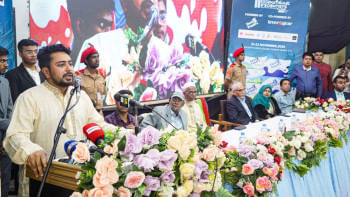Report finds measles outbreak at Tripura Para

A report by Institute of Public Health (IPH) revealed that outbreak of measles at Sonai Tripura Para under Hathazari upazila in Chittagong caused illness among children who were hospitalised in a span of a week, right after four children had died in the same area.
Azizur Rahman Siddique, civil surgeon of Chittagong, confirmed the findings to The Daily Star yesterday afternoon.
“The committee, formed to investigate the matter, sent samples of blood, cough and stool collected from six random children to IPH on Sunday. The IPH experts found the presence of measles virus in all the samples,” said the civil surgeon.
He, however, could not confirm if the same virus caused the death of four children at the beginning of the outbreak.
“As the deceased were not brought to hospital, doctors could not diagnose them. They were also cremated, so we had to rely on the information provided by their parents,” he added.
Following the death of four children, including three siblings at Tripura Para, panic broke out in the locality. Meanwhile 22 children, aged between six and seven, were hospitalised last week with the same symptoms of fever, cold and rash.
Dr Abu Sayed Mohammed Imtiaz, health officer of Hathazari upazila, said they brought all the ailing children to the health complex as their parents panicked after hearing the rumour of an unknown disease.
“The disease was not 'unknown', it was unidentified. If those four children were brought to the hospital in time, their lives could have been saved,” said Imtiaz.
He also informed that out of the 22 children, three from the same family were admitted to Faujdarhat Cholera Hospital on Sunday.
Two of them had viral pneumonia, he said. “The family admitted all three children as they feared the third child might also catch the disease.”
Meanwhile, representatives of World Health Organisation (WHO), Directorate General of Health Services and Hathazari Upazila Health Complex visited the remote locality, around 25 kilometres away from Hathazari municipality, yesterday morning.
Dr Rezaur Rahamn, programme manager of 'Extended Programme on Immunisation' supported by WHO, said, “The locals live in a dismal condition without proper education, sanitation and safe drinking water. Moreover, they are reluctant to receive medical treatment from hospitals because of superstitions.”

When the doctor asked villagers if their children were vaccinated, most of them failed to answer.
Ruma Akhter, a health worker of Malaria Eradication Programme who has been in the area for ten years, said sometimes they have to force the locals to vaccinate their children.
Regarding the control of measles outbreak, Dr Rezauar said WHO engaged all its networks in the whole area for eliminating measles.
“Standard operative procedure which is globally acknowledged for eliminating measles will be followed here. The children who have already been diagnosed with measles are risk-free right now,” he added.


 For all latest news, follow The Daily Star's Google News channel.
For all latest news, follow The Daily Star's Google News channel. 



Comments